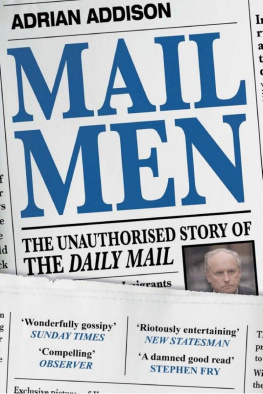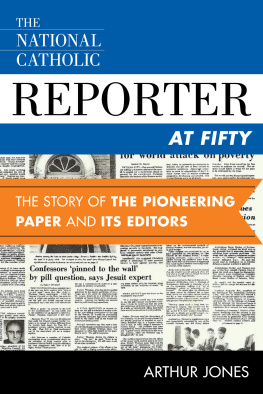Published in hardback in Great Britain in 2017 by Atlantic Books, an imprint of Atlantic Books Ltd.
Copyright Adrian Addison, 2017
The moral right of Adrian Addison to be identified as the author of this work has been asserted by him in accordance with the Copyright, Designs and Patents Act of 1988.
All rights reserved. No part of this publication may be reproduced, stored in a retrieval system, or transmitted in any form or by any means, electronic, mechanical, photocopying, recording, or otherwise, without the prior permission of both the copyright owner and the above publisher of this book.
Young Paul Dacre image in plate section reproduced with the permission of Special Collections, Leeds University Library.
LUA/PUB/002/UN/284.
10 9 8 7 6 5 4 3 2 1
A CIP catalogue record for this book is available from the British Library.
Hardback ISBN: 978 1 78239 970 4
E-book ISBN: 978 1 78239 971 1
Printed in Great Britain
Atlantic Books
An Imprint of Atlantic Books Ltd
Ormond House
2627 Boswell Street
London
WC1N 3JZ
www.atlantic-books.co.uk
CONTENTS
For Anna & Santi
INTRODUCTION
The Voice of Middle England?
Its only a newspaper.
Yet some believe the Daily Mail is imbued with almost supernatural powers it can handpick government policy and almost single-handedly scared over half the electorate into taking Britain out of the European Union. For its fans, it has been a welcome guest at breakfast tables for over 120 years; it is simply a cracking good read and the voice of good old-fashioned common sense. Its voice, however, does carry far beyond its loyal readers; it howls through Westminster corridors befuddling politicians and infuriating metropolitan liberals before whistling on through the nations newsrooms to help define the media agenda for the day. And for many, the Daily Mail is the jackbooted stomp of a bully who makes scapegoats of the weak and the vulnerable. Indeed, to them, even the very sound of its editors name is akin to Darth Vaders tin lungs on a darkened cinema screen.
Paul Dacre, the clumsy and shy middle-class son of a well-known Sunday Express showbiz writer, has been in the top chair for a quarter of a century and, unlike so many of his peers, has never sought personal fame, yet he has still managed to become one of the most hated men in Britain. Ever more people now know his name. He even became the butt of an ad-lib joke during a live and televised Monty Python gig in London in July 2014, as John Cleese later explained to fellow Python Eric Idle.
One night, the last night of all, Cleese said, when there were millions of people watching around the world, Michael [Palin] went off and I said: I heard on the radio this morning that the editor of the Daily Mail which I hate Mr Paul Dacre, has had an arsehole transplant. And Michael came back on and said, Ive just been listening to the television and apparently the arsehole has rejected him.
The joke probably got the biggest laugh of the night.
Is he still alive? Idle asked.
Oh yes, hes still alive. But hes quite crazy now. And, of course, nobody is allowed to write about an editor of a major British newspaper being crazy because they censor it. This is a new concept, press censorship in the sense of censorship of the Press by the Press. So, they criticize everyone else, they criticize politicians and businessmen and the church and doctors and sportsmen and, you know, actors and everyone but they never actually get criticized themselves and I think thats why they get so power mad.
Cleese isnt alone in reviling the Dacre name. During the media firestorm in 2013 when the Mail accused Labour Leader Ed Milibands late father of hating Britain, Match of the Day presenter and former footballer Gary Lineker tweeted: [Its] Only a matter of time before [Paul] Dacre resigns. Its what he would demand of another in this situation. Unless of course hes a hypocrite.
Paul Dacre and the Daily Mail s millions of readers, of course, disagree with this mockery and distaste. Dacre and countless Mailmen and Femails over the years have dedicated their lives to giving their readers a newspaper in which many of its staff (but not all) do, truly, believe.
Mailmen (not the Expresss reporters) had to be the first on the story, and the last to leave, Dacre once wrote, in an obituary for the modern-day Mail s founding editor, Sir David English.
A Mail salary helped pay staff mortgages and the paper gave them the best resources in the business to do their jobs, but at the cost for in which, for some including Dacre himself fifteen-hour working days were the norm.
Everyone will have told you how culty it was and probably still is, a former Mailman told the author, but thats a definite part of the theme.
The Mail machine, the product of this cult, is feared and courted by politicians in equal measure and the tension between the two has frequently caused a political punch-up. What youve got to understand about the Daily Mail, former Downing Street spin doctor Alastair Campbell told the BBCs Newsnight programme, is that it is the worst of British values posing as the best... If you do not conform to Paul Dacres narrow, twisted view of the world you get done in.
All I say, to all the politicians in Britain, [is that] once you accept you are dealing with a bully and a coward you have absolutely nothing to fear from them.
Dacre and Campbell, of course, loathe each other, and Paul Dacre does not share Campbells low opinion of his Daily Mail nor does he agree that he wields real political power.
My own view, Dacre told the BBCs Desert Island Discs in 2004, is that the politicians kind of estimation of papers being great, great political forces is a reflection of their weakness rather than newspapers strength. I dont feel powerful, no. I feel rather humble.
Every paper has to have a soul. And the Mail s is based on family values, on the two words self-reliance and aspiration. My job is to represent millions of people who dont have a voice... especially in countering that liberal, politically correct consensus that dominates so much of British public life.
It says Britain is a shameful nation with a shameful history and a culture and a people who are inherently racist, sexist and anti-European. It says the nuclear family is outmoded and that injustice in education and liberal progressive values must prevail.
Well, the fact is that most Britons dont believe this. They simply dont.
There is an unpleasant intellectual snobbery about the Mail in leftish circles, for whom the word suburban is an obscenity, Dacre wrote in the Guardian in 2013.They simply cannot comprehend how a paper that opposes the mindset they hold dear can be so successful and so loved by its millions of readers.
Whichever viewpoint you hold, the Daily Mail is as British as the Royal Mail and the pound sterling. Its consumed in quaint village cafs with cream tea and scones and at breakfast tables across Englands green and pleasant land.
It is a product aimed at these readers, not a political party. Its not funded by a television tax like the BBC nor controlled by a trust like the Guardian nor kept from the abyss by a billionaire like The Times. The people who make the Daily Mail are in the business of selling newspapers and have been, aside from a bleak period when it was almost crushed by the faster and hungrier Daily Express, rather good at it.
Or they used to be. The printed Daily Mail, like almost all newspapers, is dying. The numbers say it all: in May 2016, the











